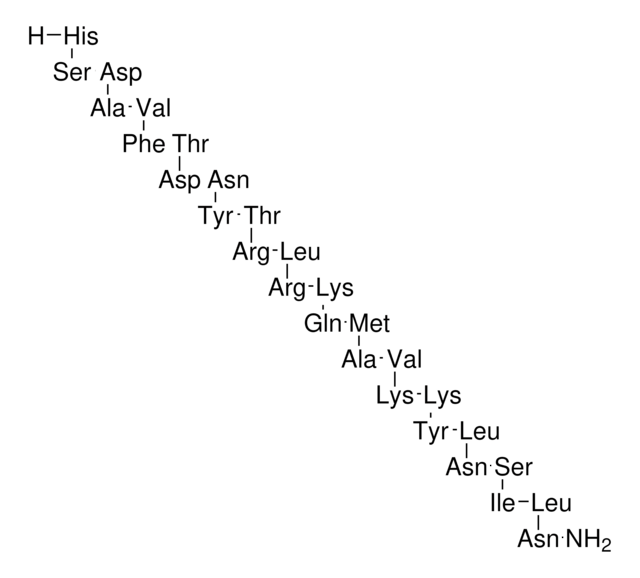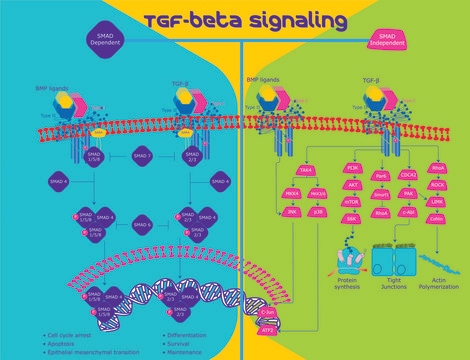추천 제품
생물학적 소스
human
재조합
expressed in E. coli
분석
≥95% (HPLC)
≥95% (SDS-PAGE)
양식
lyophilized
효능
0.5-10 μg/mL
분자량
5.2 kDa
포장
pkg of 100 μg
불순물
endotoxin, tested
UniProt 수납 번호
배송 상태
wet ice
저장 온도
−20°C
유전자 정보
human ... TMSB4X(7114)
일반 설명
Thymosin-β4 is a small, actin-sequestering protein belonging to the thymosin-β family that is found at high concentrations within the spleen, thymus, and peritoneal macrophages, where it is most notably responsible for the organization of cytoskeletal structure. Commonly found at significant quantities within the brain, lungs, liver, kidneys, testes, and heart, Thymosin-β4 has also been shown to be synthesized by cells unrelated to the reticuloendothelial system, such as myoblasts and fibroblasts, and expressed at irregular levels by several hemopoietic cell lines, malignant lymphoid cells and myeloma cells. The gene is mapped to human chromosome Xq21-22. Recombinant Human Thymosin-β4 is a 5.2kDa glycoprotein containing 45 amino acid residues.
생화학적/생리학적 작용
In mammalian tissues, thymosin-β4 protein acts as a modulator for the polymerization/depolymerization of actin through the formation of a 1:1 complex with the monomer G (globular)-actin, and inhibits actin′s polymerization to form F (filamentous) actin, which together with other proteins binds microfilaments to construct the cytoskeleton. In addition to regulating actin polymerization, research has also found thymosin-β4 to stimulate the secretion of hypothalamic luteinizing hormone-releasing hormone and luteinizing hormone, inhibit the migration of peritoneal macrophages, induce phenotypic changes in T cell lines during early host defense mechanisms, and inhibit the progression of hematopoietic pluripotent stem cells into the S-phase. It also enhances angiogenesis, endothelial cell migration and adhesion and tubule formation. Thymosin-β4 also participates in wound healing by reducing inflammation and by exhibiting anti-fibrotic effects. It also controls the migration of cancer cells.
물리적 형태
Lyophilized with no additives.
재구성
Centrifuge the vial prior to opening. Reconstitute in water to a concentration of 0.1-1.0 mg/ml. Do not vortex. This solution can be stored at 2-8 °C for up to 1 week. For extended storage, it is recommended to further dilute in a buffer containing a carrier protein (example 0.1% BSA) and store in working aliquots at -20 °C to -80 °C.
Storage Class Code
11 - Combustible Solids
WGK
WGK 3
Flash Point (°F)
Not applicable
Flash Point (°C)
Not applicable
가장 최신 버전 중 하나를 선택하세요:
The actin-sequestering protein thymosin beta-4 is a novel target of hypoxia-inducible nitric oxide and HIF-1a regulation.
Ryu YK, et al.
PLoS ONE, 9, e106532-e106532 (2014)
Thymosin ?4-sulfoxide attenuates inflammatory cell infiltration and promotes cardiac wound healing.
Evans MA, et al.
Nature Communications, 4, 2081-2081 (2013)
The actin binding site on thymosin beta4 promotes angiogenesis.
Philp D, et al.
Faseb Journal, 17, 2103-2105 (2003)
Alexander Belyy et al.
Nature communications, 12(1), 6628-6628 (2021-11-18)
Bacterial human pathogens secrete initially inactive nucleotidyl cyclases that become potent enzymes by binding to actin inside eukaryotic host cells. The underlying molecular mechanism of this activation is, however, unclear. Here, we report structures of ExoY from Pseudomonas aeruginosa and
beta-Thymosins, small acidic peptides with multiple functions.
Huff T, et al.
The International Journal of Biochemistry & Cell Biology, 33, 205-220 (2001)
자사의 과학자팀은 생명 과학, 재료 과학, 화학 합성, 크로마토그래피, 분석 및 기타 많은 영역을 포함한 모든 과학 분야에 경험이 있습니다..
고객지원팀으로 연락바랍니다.








